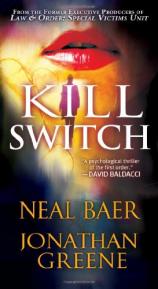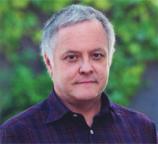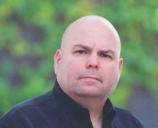Interview: December 16, 2011
In Neal Baer and Jonathan Greene’s debut novel, KILL SWITCH, forensic psychiatrist Claire Waters takes on a troubling case that leads her directly into a maniacal killer’s path. In this interview, the former executive producers of “Law & Order: Special Victims Unit” discuss the process of developing their book, which began as an idea for a feature film. They share how they met and began collaborating, discuss the different processes of writing for television versus penning a novel, and give advice to aspiring authors.
Bookreporter.com:You have had a remarkable degree of success collaborating in television, most notably with the long-running “Law & Order: Special Victims Unit” and more recently with “A Gifted Man.” KILL SWITCH also deals with brutal crimes yet is quite different from your television productions in other ways. What led you to collaborate on a novel? Is it a project that you came to naturally, or did one of you have to drag the other along a bit?
Neal Baer and Jonathan Greene: We'd have to say that, based on the subject matter and given our individual backgrounds (Neal's as a pediatrician and Jon's as a former journalist) and our experience writing for “SVU,” this is indeed a project we came to naturally. The interesting part, though, is that it didn't start as a novel, it actually started as an idea for a feature film (more on this later). But we both dove into this willingly once given the opportunity to write it as a novel.
BRC: KILL SWITCH deals with two very different characters who slowly gravitate toward each other. Claire Waters is completing a fellowship in forensic psychiatry when she recommends a sex offender for a release program. He is barely out on the street before he is wanted for a series of murders. Nick Lawler is an NYPD detective who is tasked with solving the crimes. They initially conflict, yet gradually come to find that their similarities are greater than their differences, and help each other with the significant burdens each of them is carrying. As you began to write KILL SWITCH, which developed first: the Waters and Lawler characters, or the plot? Or did you begin another way?
NB & JG: All that is KILL SWITCH began with the idea for Claire Waters's character. Neal had come to Jon those many years ago with the idea to write about a female forensic psychiatrist; the plot grew out of how we imagined her journey. It quickly became clear we'd have to team her with a detective to play out whatever story we were going to write, which was the genesis for Nick Lawler's character.
BRC: One notable common element between KILL SWITCH and your work for television is the way you incorporate surprising twists and turns into the plot. Did you outline? What skills from your time in the writer’s room or plotting out a show carried over to your novel writing?
NB & JG: Whether you write television, novels, plays, feature films, etc., here's the common denominator: everyone loves a compelling story, well-told, with characters that jump off the page, stage or screen. Between Neal's run on “ER,” and our time together on “SVU” and “A Gifted Man,” we have a lot of experience in twisting stories to keep our viewers riveted, and those skills absolutely carry over from our television writing to KILL SWITCH. One of the more interesting points of how this book came to be is that, yes, we did indeed outline, but we wrote the outline eight years ago --- and it was for a feature film with the same characters. We were going to call the movie "Blindsided" (we shelved that title when THE BLIND SIDE was released as a movie several years ago).
BRC: One of the things that I found to be most impressive about KILL SWITCH was the seamless flow of the narrative. I would be hard-pressed to determine where one of you stopped writing and the other commenced throughout the book. How did you collaborate? What was the best part of working together? And what was the most challenging?
NB & JG: We've been working together for so long that we've reached the point where we can be batting the fine points of a story back and forth and one of us knows what the other is going to say before he says it. Which is to say, we collaborated as we have during the 12 seasons of television we've done together: seamlessly. As for the seamless writing, one of the things you learn quickly in television is that in writing a series, you have to learn to incorporate your own voice as a writer into the voice of the show itself. So we also have a lot of experience writing with one voice. So perhaps the best part of writing together is that we already knew how to write together. The more challenging part was the form itself, which we'll get into in the next question.
BRC: How does the act of collaborating on a novel differ from working together on a television series?
NB & JG: In television, you don't just collaborate with the person with whom you write. You collaborate with all the writers on the staff, and all the people who take what you've written and turn it into a finished TV show: director, actors, production designer, artists, casting directors, film editors, and countless others. You rely on these people to interpret your script, your vision, and create the finished project. In writing a novel, all these people are rolled into one: the author. You have to create the voices of the characters, and paint the word pictures that enable the reader to see the story unfold in front of them, both visually and in narrative.
BRC: How did the two of you initially meet and decide to work together in your television pursuits? Did you ever anticipate that you would at some point collaborate on a novel such as KILL SWITCH?
NB & JG: Jon was hired as a writer on “Law & Order: SVU” in September of 2000, in the middle of season two. Three weeks later, Neal was hired as the Executive Producer/Head Writer, or, as we call it in our business, "showrunner." We quickly learned that we worked well together, though it's probably safe to say that at the time we could hardly anticipate we'd ever write a novel together.
BRC: Walk us through how the book came to be written and published. Whose idea was it? What happened next?
NB & JG: The original idea was for a feature film about a female forensic psychiatrist that Neal brought to Jon and suggested we write together. We wrote a 35-page outline over the summer of 2002, and then life and work got in the way of writing the screenplay: Neal was finishing his medical residency at Children's Hospital in Los Angeles, Jon's first child was born, and in the middle of all of this we were both still working on SVU, which took a lot of our time. Over the ensuing years, we kept saying we should write the screenplay and then never got around to it. Then, about two years ago, our book agent, Lydia Wills, asked whether we had anything like a medical thriller lying around that would make a good novel. We instantly thought about our movie outline. Lydia suggested we write three chapters and include that with the outline as a book proposal. So we wrote the three chapters, then two more, and the next thing we knew we had a three-book deal with our wonderful publishers, Kensington Books.
BRC: Has KILL SWITCH been optioned for film or television? If so, what can you share about this?
NB & JG: We're working on this. Katherine Heigl is attached to play Claire in a feature film version of the book. Stay tuned.
BRC: As debut novelists, what do you see as similar between the book and television worlds? What’s different?
NB & JG: The similarity lies in the nature of storytelling: again, everyone loves a great story. There are many differences, though, and the biggest one is time. It took us about 10 months to write the book from beginning to end, and then another five months for it to hit the shelves. When you write television, it takes about two to three weeks to write an hour-long script from beginning to end, and six weeks after you've finished writing it, the episode is on the screen.
BRC: It is obvious from KILL SWITCH, as well as your work in television, that you are fans of crime and detective fiction. What authors and/or books have had the greatest influence upon you?
JG: I've been a voracious reader since I was a kid, and I read a lot of nonfiction, whatever I could get my hands on, whether political, medical, biography or true crime, by many different authors. But it wasn't until I was a teenager that I read my first Robert Ludlum novel, THE CHANCELLOR MANUSCRIPT, and got hooked. I was given another Ludlum book, THE MATARESE CIRCLE (which I consider his finest work) as a high school graduation present. From there I went on to enjoy numerous other authors in the mystery/thriller genre: David Baldacci, Tom Clancy and Joseph Wambaugh, to name just a few.
NB: I'm a fan of film noir and ’40s detective movies, so naturally I love Raymond Chandler. I'm also a rabid fan of Alfred Hitchcock, and his influence, particularly the movie Vertigo, seeps through KILL SWITCH.
BRC: Most great writers are also great readers. Have you read anything recently that you would like to recommend to our readers?
JG: There have been several books in the last few years that I haven't been able to put down: IN THE LONG RUN by Jim Axelrod, THE YIDDISH POLICEMAN'S UNION by Michael Chabon, and THE TENDER BAR by J.R. Moehringer foremost among them.
NB: Most recently, I read TO THE END OF THE LAND by Israeli writer David Grossman, an intimate story of a mother's journey to deal with her son's reenlistment in the Israeli Army. I found myself captivated by Grossman's heartrending prose and lingered over many moments of sorrow and terror and the love a parent has for her child.
BRC: Many of our readers are prospective authors. Do you have any advice you would wish to share with them?
NB & JG: The best advice a writer can give prospective writers is to not be afraid to write. Both of us came to television and novel writing after having had other careers, and the only way it happens for you is to make it happen with a piece of material you're proud of. The other advice is that real, professional writing is learning how to re-write yourself and to take constructive criticism. We're given scripts to read all the time, and the biggest mistake first-time writers make is to not go back once they've finished (which is a huge accomplishment to begin with) and check to make sure the story makes sense, the dialogue is top-notch, the characters really pop. And then you have to go back again, and again, and again, and keep rewriting and tweaking until you're sure what you're showing to people is your absolute best work.
BRC: If you weren’t doing what you are doing --- both in film and publishing --- what do you think you would be doing for a living?
JG: Not sure. I would probably try my hand at teaching, something I've come to enjoy.
NB: I'd be a pediatrician.
BRC: I’ve read that KILL SWITCH will be the first in a series of three books. When will the sequel be available, and is there anything you can tell us about it? Do you already have books two and three mapped out?
NB & JG: Book two again with our protagonist, Claire Waters, will be out late next year, and we don't want to give anything away. Stay tuned.





